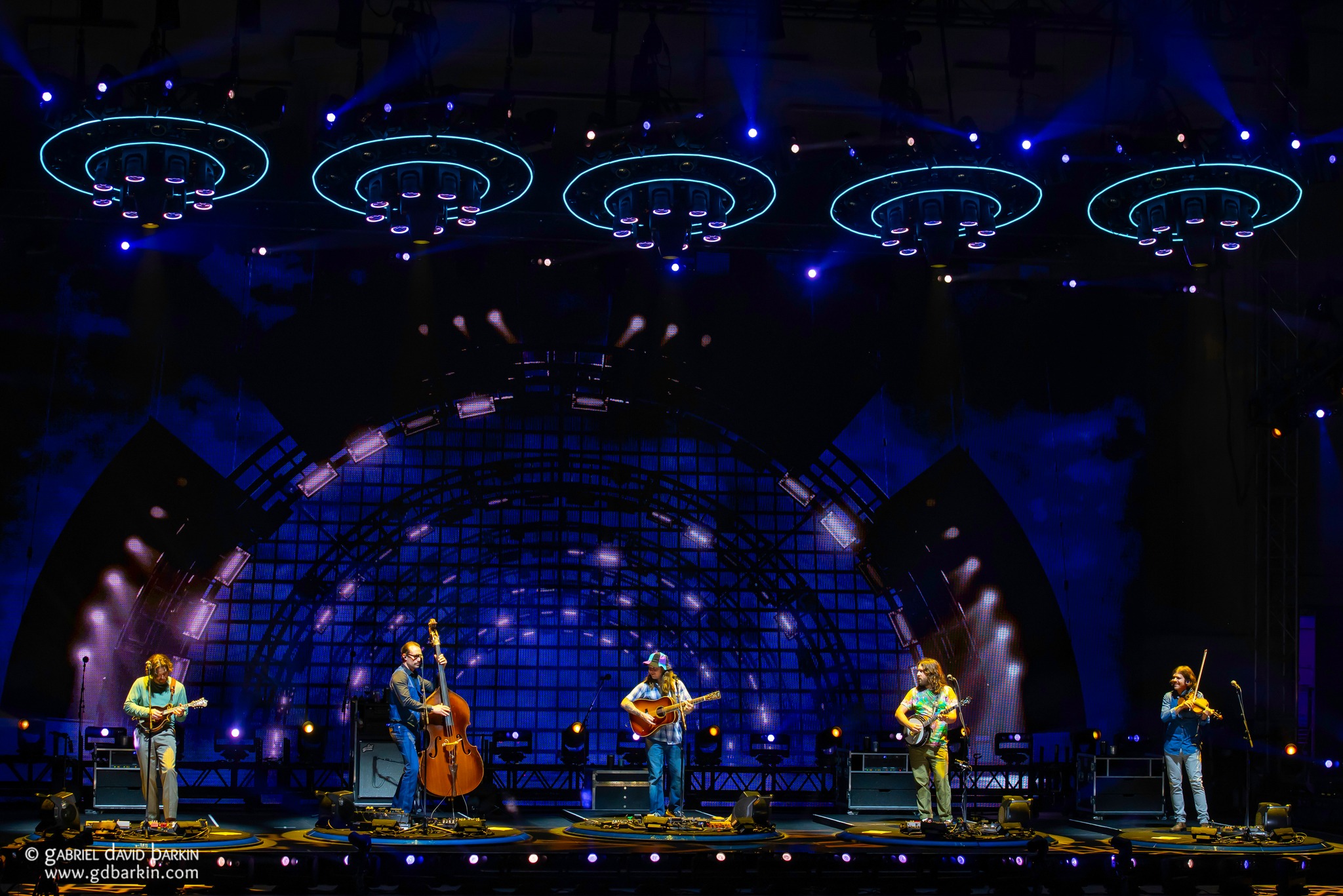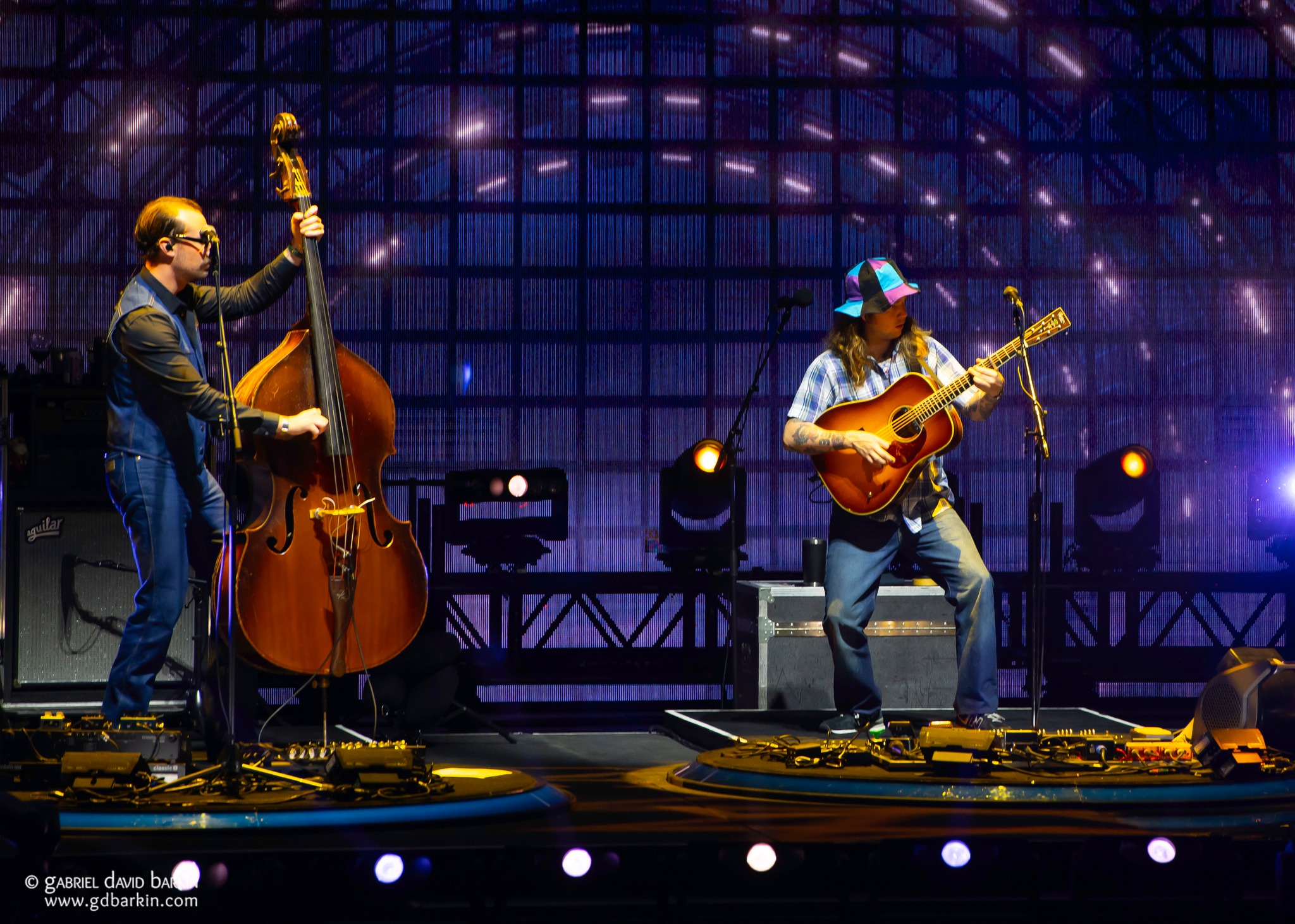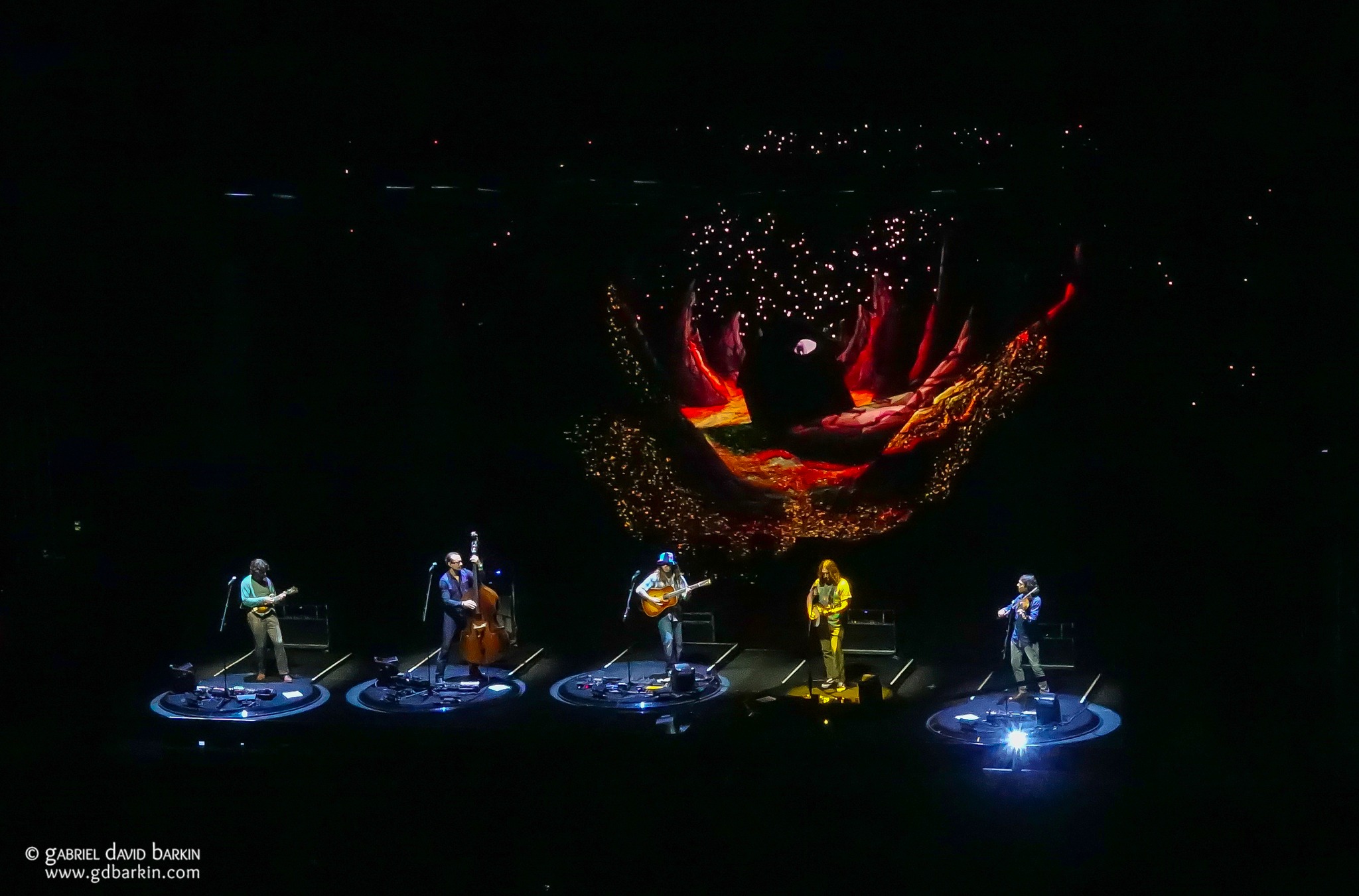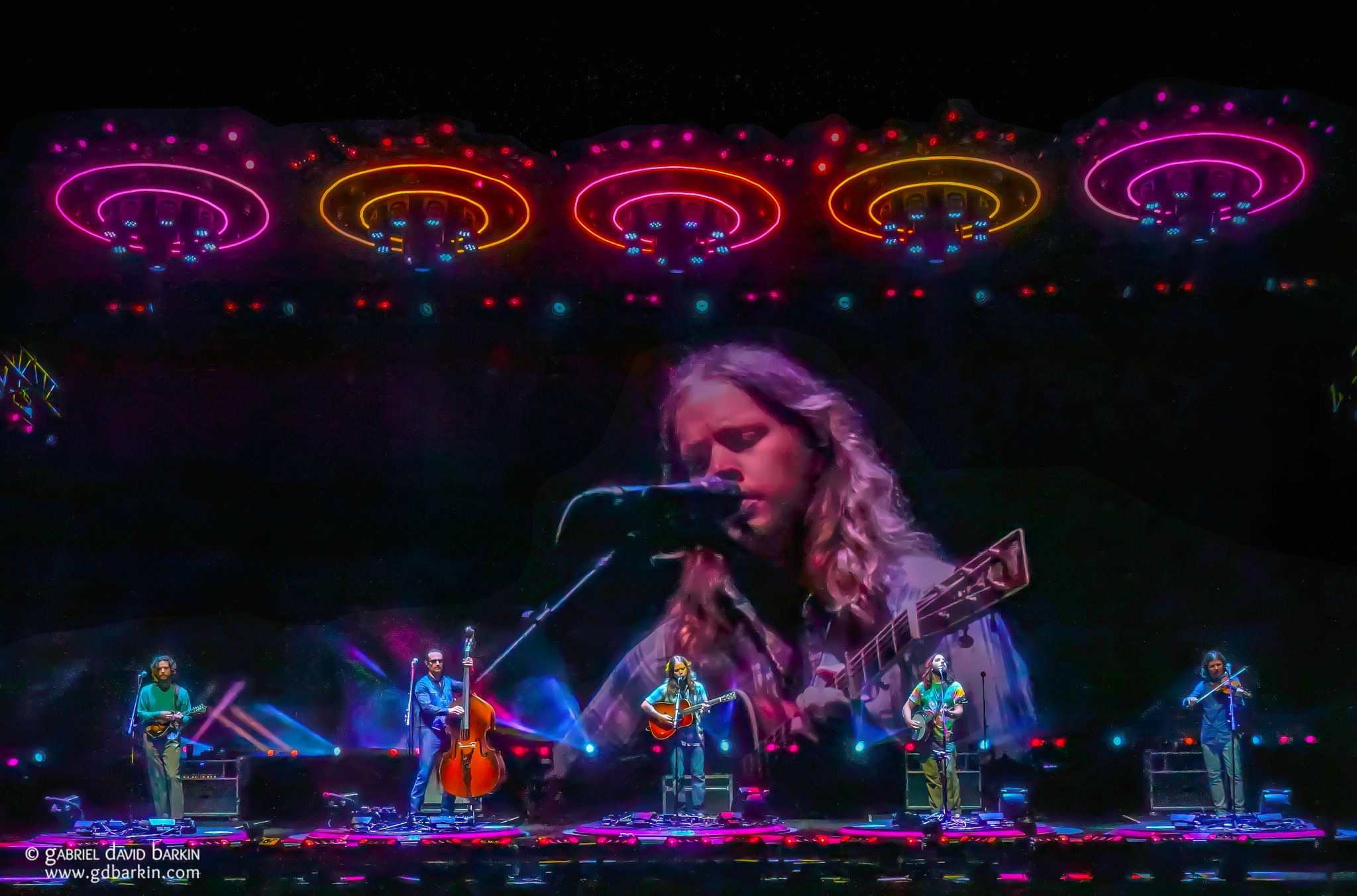"It’s strange for me sometimes because I was born in 1992... but I really like the old music." That’s a quote from Billy Strings at his Greek Theatre performance Saturday night. And that’s Billy Strings through and through. But he must also like the “new music” – or perhaps we could call it the “slightly less-old” music of the psychedelic jam world. His set at Berkeley’s Greek Theatre on Saturday night (the first of two shows in the Bay Area) was infused with Strings’ blend of both “old” and “new” music, an amalgam of classic bluegrass and spacey jam-tasticness.
The crowd was a mix of “old” and “new” as well. Old-school Deadheads – you know, the ones who actually saw Jerry, and maybe even Pigpen – swirled with 20-somethings who sway and swing like they’ve been doing that rag their entire lives. (Hint: many of them learned it from their 'rents.) It might be odd at times for Billy to look out at his audience and see so many sexagenarians and septuagenarians, but there’s no shortage of young’uns either.

As one of my friends said, “This band has the Deadiest scene around—maybe even more Dead-y than the Dead these days.” And that sentiment goes for a wide swath of the all-ages audience at the Greek.
The show began a half-hour past the ticketed start time. During the wait, an enthusiastic announcer chimed in every five minutes to let the crowd know it was “Fifteen [then ten, then five] minutes to rainbows!” Finally, during an epic Bay Area sunset visible to the audience on the Greek’s lawn, Billy and Co. kicked off the festivities with "Wild Bill Jones," a song originally performed by bluegrass forefathers The Stanley Brothers.
For nearly three hours, Strings and his mates kicked ass, took names, and covered a wide waterfront of traditional and newgrass country. There was no shortage of “ooh” and “ahh” moments from each of the band members. Strings’ name is on the marquee, and he sings all the songs on most nights, but it’s no secret that all four of his associates are themselves masters of their stringed domains. Pick any one of them—Billy Failing (banjo), Royal Masat (bass), Jarrod Walker (mandolin), or Alex Hargreaves (fiddle)—and you could build a world-class bluegrass band around their picking.
By the end of "Secrets," the second song of the evening, anyone who wasn’t already in awe of the assembly of musicians before them was experiencing a revelation.
Still, it wasn’t until a few songs later that the band began kicking up dust in full-jam gear. The ensemble is well-equipped to segue from traditional porch music into extended segments, often built around one-chord themes that allow Billy and Co. to stretch the definition of “bluegrass” before launching back into the coda of the last song or starting a new one. The transition from "Be Your Man" to "Running," for instance, was a tour de force of increasingly breathless, furious energy.

Breathlessness is indeed a key factor in Strings’ live performances. He will take your breath away. The entire band plays with such endless liveliness that it fills every space of your brain. It reminds me of the time I saw comedian John Oliver, whose jokes came so fast that I barely had time to bust a gut laughing before the next punchline hit. I had no mental airspace to process any of his jokes, to file them away in the "Remember this one, it's a hoot!" part of my brain. At the end of the night, I couldn’t remember a single joke, but I knew I’d had a rip-roarin’ time. It’s like that with Billy Strings’ shows. (I’m also reminded of a bemused criticism of Mozart’s music in the film Amadeus: “Too many notes!” Somehow, Mozart survived that gibe to achieve a legacy worthy of GOAT consideration—just as Billy Strings likely will.)
Strings kicked off the second set with a solo turn on banjo for "Ol' Rickard" and the oft-covered traditional "Reuben's Train." Though many may associate this tune with the bluegrass genre, it is much older, predating the popularization of bluegrass. Earl Scruggs, a pioneer of the three-finger banjo style, played "Reuben" as a kid in the 1930s, helping to integrate it into the bluegrass lexicon. While Doc Watson recorded it with Flatt & Scruggs in 1967, he never considered himself a bluegrass musician. "Reuben’s Train" has long been played both within and outside the bluegrass world, a testament to its enduring appeal.
Next, with the rest of the band back on stage, Strings said, “I’ll do this number here just in case there’s anybody getting hungry.” They launched into Doc Watson’s playful tune "The Muskrat Song."

Later in the second set, "Seven Weeks in County," a new Strings song, proved a crowd-pleaser with a long stretch of instrumental highway that gave ample room for each of the four soloists to stretch out, anchored of course by Masat’s steady bass thumping. A red balloon, possibly filled with nitrous oxide from one of the outside vendors, landed on the stage just at the crescendo of Hargreaves’ fiddle solo. The Californians roared again.
("Seven Weeks in County" will appear on Strings’ upcoming album Highway Prayers, to be released on September 27 by Reprise Records. Attendees at the Greek on the following day were treated to another new one, "Leadfoot," a fun, pile-driving romp.)
For the Deadhead faithful, Strings threw in a cover of "I've Been All Around This World." There were also snatches of classic rock riffs in Strings’ solos throughout the evening, including a snippet of "Oye Como Va" and a tease of "Also sprach Zarathustra." Again, the “old” mixed in with the “new.”
Billy and Co. use minimal effects for many of their traditional-style songs, but they each have an array of pedals to amp things up, which they do frequently. Strings’ guitar in particular often hums with distortion and envelope filters. At times, he goes into the stratosphere with riffs and timbre more akin to Steve Howe of Yes than to Doc Watson’s or Tony Rice’s flatpicking. When Strings goes into his double- and quadruple-time riffs with the full array of electronic effects, the crowd goes nuts.
The light show for this summer’s outings is brilliant, both literally and metaphorically. Strings has toned down the number of lights blaring at the audience since his last tour (it was quite blinding at times). Five circular rigs hung above the stage, one hovering over each band member like flying rainbow saucers. A video screen behind the stage made sparing use of live images, only occasionally showing Strings and his mates. A few cartoonish animations augmented rather than distracted from the music and the mood.
Those in the pit couldn’t see this from their vantage point, but each of the musicians stood on a black, circular pad mirroring the flying saucer rigs above their heads. The effect was reminiscent of Star Trek transporter pads; it might not have surprised some crowd members if anyone in the band began to levitate or turned out to be a hologram.

The players stood on their pads all night, except for occasional forays by Strings to the front or sides of the stage. (He seemed more animated on Sunday night, venturing out more frequently.)
Some folks at the show might miss the intimacy of bluegrass bands who hover around one mic. It would be a treat to see these guys do an all-acoustic, no-effects show sometime.
Sound-wise, the Greek Theatre was not put to its best amphitheatrical use. The GA orchestra pit was a bit bass-heavy. Up in the stone seats (with assigned seating) and on the GA lawn, however, the audio was clear and crisp.
To close the show, Strings spoke about liking old music and old musicians, name-checking David Grisman and Del McCoury in particular, and then paid tribute to a fallen hero. “We lost a great fiddler yesterday, Bobby Hicks.” In Hicks’ honor, Hargreaves took the lead on the maestro’s "Maiden's Prayer." This was followed by a Lester Flatt & Earl Scruggs song, "Your Love Is Like a Flower." Finally, Strings gave the audience a final hoot-n’-holler opportunity with one of his own tunes, the crowd favorite "Dust in a Baggie."
As the Greek Theatre curfew loomed, Billy and Co. returned for an a cappella turn at "Richard Petty." The audience took their time to breathe as the harmonies rang out into the Berkeley hills. After a great evening of the “old” and the “new,” both the youngsters and old-timers in the audience gave enthusiastic applause to the quintet, and many vowed to come back for more on Sunday.






















